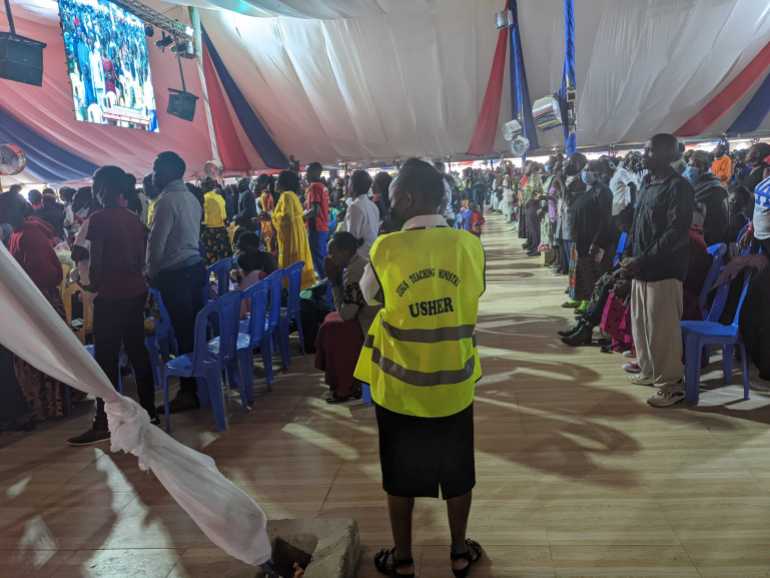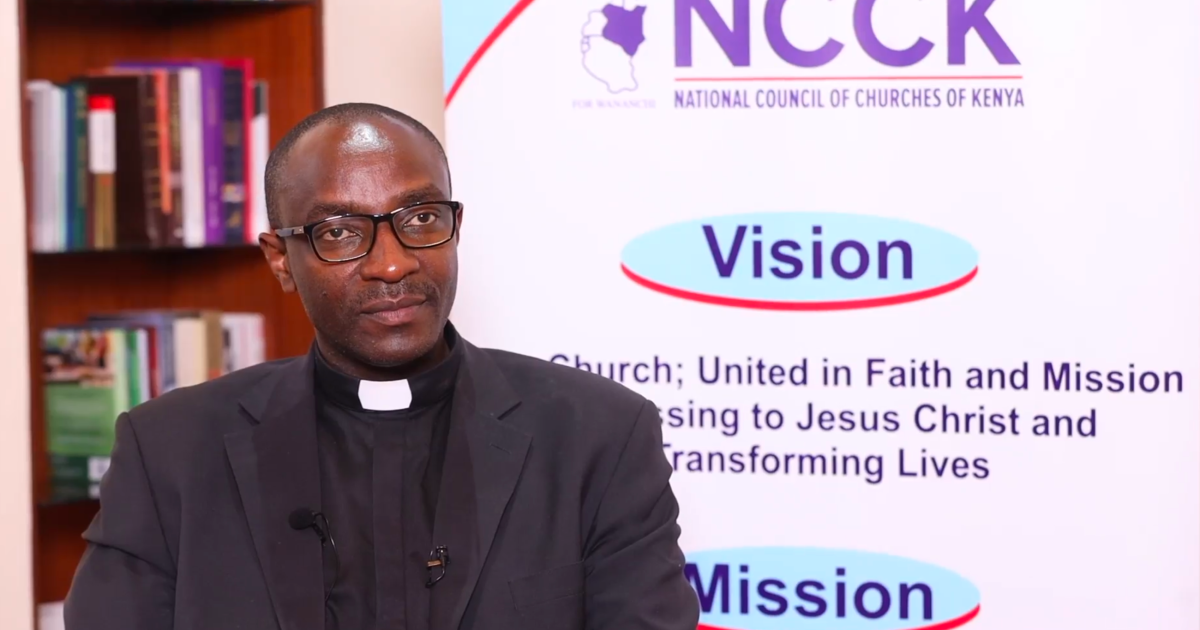Touch not my anointed: Holy fever grips Kenya in election season | Elections
Nairobi, Kenya – They may not be on the ballot or possess Kenyan citizenship but the names God and Jesus Christ are all over the politics of the East African nation.
“Stop pretending to be deputy Jesus,” Martha Karua, the former justice minister who is the running mate of leading challenger Raila Odinga said in Swahili at a rally on August 3.
It was a jibe directed at William Ruto, the deputy president and the main opponent for the presidency, who had cried during a prayer service days earlier.
Both men are the leading challengers to succeed Uhuru Kenyatta, who is constitutionally barred from serving more than two five-year terms, after Tuesday’s vote.
Of the other two front-line contenders, one, David Mwaure is a bishop. ““Bhang (cannabis) is smoked in Israel, even Jesus smoked weed,” George Wajackoyah, the fourth candidate, who is proposing legalisation of cannabis farms, said at a rally.
More than 85 percent of Kenya’s estimated 56 million people are Christians even though it is constitutionally a secular state.
For decades, politicians have sought to use Christianity in influencing the hearts and voting thumbs of many of Kenya’s voters.
Unsurprisingly, religion has been regularly invoked this election season, despite Ruto’s Kenya Kwanza coalition framing of the polls as a contest between “hustlers and dynasties”, pitting the unemployed in Kenya against the families of Odinga and Kenyatta, sons of the first president and vice president of the country.
“Someone once said our elections are an ethnic census,” Reverend Canon Chris Kinyanjui, the general secretary of the National Council of Churches (NCCK), said. “So this is a maturity of our democracy.”
“We need to note that this is a narrative of class dimensions, trying to mobilise inequalities and the gap between rich and poor,” Karuti Kanyinga, a professor of development studies at the University of Nairobi’s Institute for Development Studies (IDS), told Al Jazeera. “It has undermined mobilisation of politics along ethnic lines … ethnicity remains an important factor but not as essential as before. For the first time in our politics, we have an issue-based campaign.”
But he strongly disagreed that religion was a big deciding factor in Kenyan elections. “It is ignorant white commentators who say that – that’s Western media analysis,” he said.
“Ethnicity is the social factor that has always had an upper hand, we have never had religion, except in eastern province where 90 percent are Muslims,” Kanyinga added.
Still, politicians and even clerics are using the religion card.

‘Who can be against God’s elect?’
Ruto, who has been seen more than the other contenders in church, also regularly donates to Christian causes.
In contrast, many are uncertain of Odinga’s beliefs.
In July, he caused a ruckus when he declared that “there is a colonial ideology in Kenya that elevated Christianity above all other religions” and “my government will end that.”
The country’s atheist community backed his statement afterwards and his opponents have capitalised on that.
“Dear Lord, you are not going to allow the spirit of the evil one to prevail in this country … we pray for all Kenyans whose have placed their hope in Ruto,” legislator Ndindi Nyoro prayed at an August 7 rally in Kirigiti, 17km (10.5 miles) north of Nairobi.
“It’s not been an easy journey for us but if God be for us, who can be against us … who can be against God’s elect?” Sakaja Johnson, a senator for Nairobi county and the Kenya Kwanza governorship flag bearer said at a church service on August 7, before introducing “Evangelist William Ruto” to speak.
“The ministry has been under attack,” Johnson said.
Before the return to multiparty politics in 1992, the NCCK applied pressure to the state alongside civil society and politicians, Kinyanjui told Al Jazeera.
During the disputed 2007 elections that left more than 1,000 people dead and an estimated half a million others displaced, it provided humanitarian assistance and played a role in the diffusion of tensions.
This time, it is providing a parallel tallying system – like 17 other organisations – to that of the Independent Electoral and Boundaries Commission (IEBC) and has deployed 6,000 observers across the country, Kinyanjui said.
The NCCK is also officially taking a neutral stance because “all the candidates are part of our flock”, according to Kinyanjui. In October 2021, it urged its members not to politick within churches.

Of good men and God’s will
But some like Bishop Elizabeth Thuiya have decided to heed what she says is God’s will. The 39-year-old founder of the Delta Prophetic Latter Ministries has been campaigning for her preferred candidate at every opportunity.
“In 2019, I had fasted for 21 days, the spirit of God came upon me and I started telling people that in 2022, I will determine who becomes president prophetically,” Thuiya who is also from Gatundu, the hometown of incumbent President Uhuru Kenyatta, told Al Jazeera.
“God is telling me Raila will become president,” she said. “The Holy Spirit gave me that prophetic word, that the stone the builders rejected will become the chief cornerstone.”
Thuiya is now leading a pack of clergy praying for Odinga’s victory. But a few years ago, she prophesied that it was Ruto who would become her kinsman’s successor.
“You cannot understand the things of the [Holy] Spirit,” she told Al Jazeera, saying she asked God for forgiveness for doubting Odinga’s salvation.
She also claimed Ruto was greedy and had dishonoured Uhuru by beginning presidential campaigns early and picking a fight with his boss after “the handshake”, the 2018 reconciliation between the president and the former prime minister who had been archrivals for years.
“In the word of God, Elisha and Elijah had a covenant,” she said, also comparing Ruto to Lucifer who fell out of favour with God after being too proud. “It was like that with Uhuru and Ruto until he changed … the Holy Spirit told me he won’t allow a transition of dishonour.”
Elsewhere Peter Manyuru, a longtime associate of Ruto and general overseer of Jesus Teaching Ministries, one of the country’s biggest churches, has been more consistent.
At the August 7 service, he prayed for Sakaja and Ruto kneeling just below the elevated pulpit. A church representative told Al Jazeera he was unsure of the attendance but that the dome, comprising multiple tents, and which was full, could contain between 15,000-20,000 people.
“We cannot be casting away demons and you did not vote … there are demons you cast away with prayers and demons you cast away with your vote,” Manyaru said, in a passionate sermon, charging everyone present to be peacemakers but also vote. “Enough is enough … we must go and vote good men.”
The congregation responded with uncountable “hallelujahs” and the stomping of feet backed by joyous piano riffs from the choir.
Ruto who came with a big Bible, joined others present to raise his hands intermittently in the direction of heaven.
“We appreciate leaders who keep their word”, Manuyuru said, stopping short of endorsing Ruto directly. “When he was first here, he said he would be back, we have been talking on the phone and he is here … we need a leader who will support us in this ministry.”
Around the same time, a group of clergy from different denominations converged in the amphitheatre of the state-owned Kenyan International Conference Centre.
Among them was a delegation from the Holy Ghost Church of East Africa also known as Akorinos, a small conservative sect based mostly in West and Central Kenya.
“It is our obligation to pray for our leaders and we are here to pray because he is one of the determinants of what happens to our nation after elections”, Reverend Lucas Karanja, the leader of the delegation said, his hand steadying a turban on his head – part of the sect’s dressing.
“And he invited us to pray,” the reverend told Al Jazeera.





Pingback: cartel oil co disposable
Pingback: https://www.timesunion.com/marketplace/article/phenq-reviews-17525542.php
Pingback: learn the facts here now
Pingback: naakte tiet
Pingback: click here to read